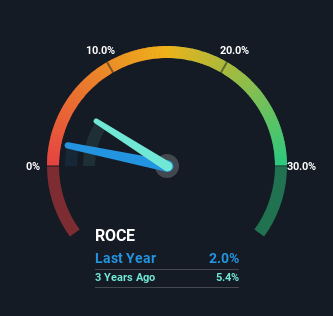- New Zealand
- /
- Electric Utilities
- /
- NZSE:CEN
Here's What's Concerning About Contact Energy's (NZSE:CEN) Returns On Capital

What financial metrics can indicate to us that a company is maturing or even in decline? Typically, we'll see the trend of both return on capital employed (ROCE) declining and this usually coincides with a decreasing amount of capital employed. Basically the company is earning less on its investments and it is also reducing its total assets. On that note, looking into Contact Energy (NZSE:CEN), we weren't too upbeat about how things were going.
What Is Return On Capital Employed (ROCE)?
Just to clarify if you're unsure, ROCE is a metric for evaluating how much pre-tax income (in percentage terms) a company earns on the capital invested in its business. Analysts use this formula to calculate it for Contact Energy:
Return on Capital Employed = Earnings Before Interest and Tax (EBIT) ÷ (Total Assets - Current Liabilities)
0.02 = NZ$90m ÷ (NZ$5.4b - NZ$795m) (Based on the trailing twelve months to December 2022).
So, Contact Energy has an ROCE of 2.0%. Ultimately, that's a low return and it under-performs the Electric Utilities industry average of 5.9%.
View our latest analysis for Contact Energy

Above you can see how the current ROCE for Contact Energy compares to its prior returns on capital, but there's only so much you can tell from the past. If you'd like, you can check out the forecasts from the analysts covering Contact Energy here for free.
SWOT Analysis for Contact Energy
- Debt is well covered by cash flow.
- Earnings declined over the past year.
- Interest payments on debt are not well covered.
- Dividend is low compared to the top 25% of dividend payers in the Electric Utilities market.
- Annual earnings are forecast to grow faster than the New Zealander market.
- Trading below our estimate of fair value by more than 20%.
- Dividends are not covered by earnings.
- Annual revenue is forecast to grow slower than the New Zealander market.
What The Trend Of ROCE Can Tell Us
There is reason to be cautious about Contact Energy, given the returns are trending downwards. To be more specific, the ROCE was 4.5% five years ago, but since then it has dropped noticeably. On top of that, it's worth noting that the amount of capital employed within the business has remained relatively steady. Since returns are falling and the business has the same amount of assets employed, this can suggest it's a mature business that hasn't had much growth in the last five years. So because these trends aren't typically conducive to creating a multi-bagger, we wouldn't hold our breath on Contact Energy becoming one if things continue as they have.
The Bottom Line
All in all, the lower returns from the same amount of capital employed aren't exactly signs of a compounding machine. However the stock has delivered a 87% return to shareholders over the last five years, so investors might be expecting the trends to turn around. Regardless, we don't feel too comfortable with the fundamentals so we'd be steering clear of this stock for now.
Contact Energy does come with some risks though, we found 3 warning signs in our investment analysis, and 2 of those are a bit unpleasant...
For those who like to invest in solid companies, check out this free list of companies with solid balance sheets and high returns on equity.
New: AI Stock Screener & Alerts
Our new AI Stock Screener scans the market every day to uncover opportunities.
• Dividend Powerhouses (3%+ Yield)
• Undervalued Small Caps with Insider Buying
• High growth Tech and AI Companies
Or build your own from over 50 metrics.
Have feedback on this article? Concerned about the content? Get in touch with us directly. Alternatively, email editorial-team (at) simplywallst.com.
This article by Simply Wall St is general in nature. We provide commentary based on historical data and analyst forecasts only using an unbiased methodology and our articles are not intended to be financial advice. It does not constitute a recommendation to buy or sell any stock, and does not take account of your objectives, or your financial situation. We aim to bring you long-term focused analysis driven by fundamental data. Note that our analysis may not factor in the latest price-sensitive company announcements or qualitative material. Simply Wall St has no position in any stocks mentioned.
About NZSE:CEN
Contact Energy
Generates and sells electricity and natural gas in New Zealand.
Fair value second-rate dividend payer.


